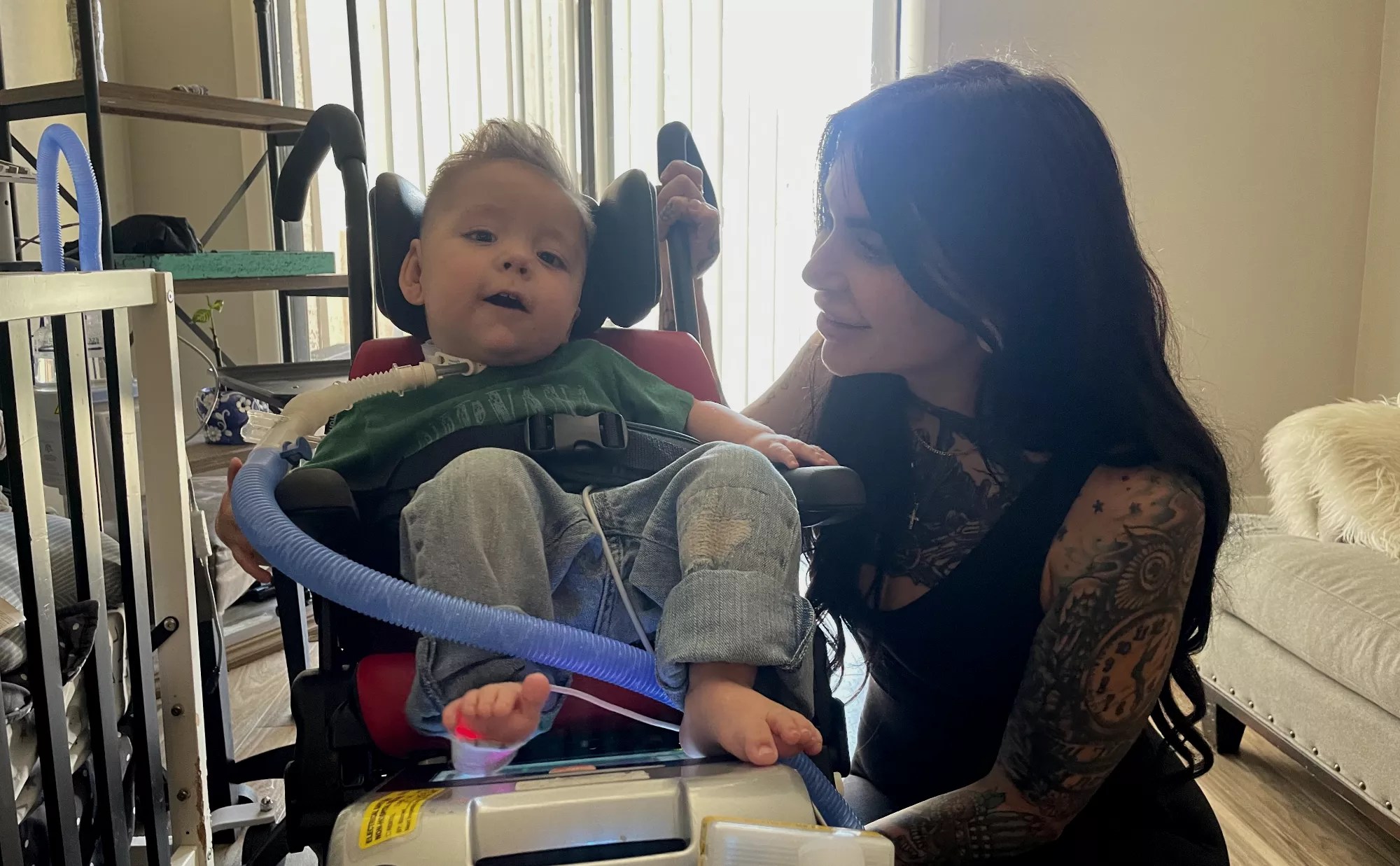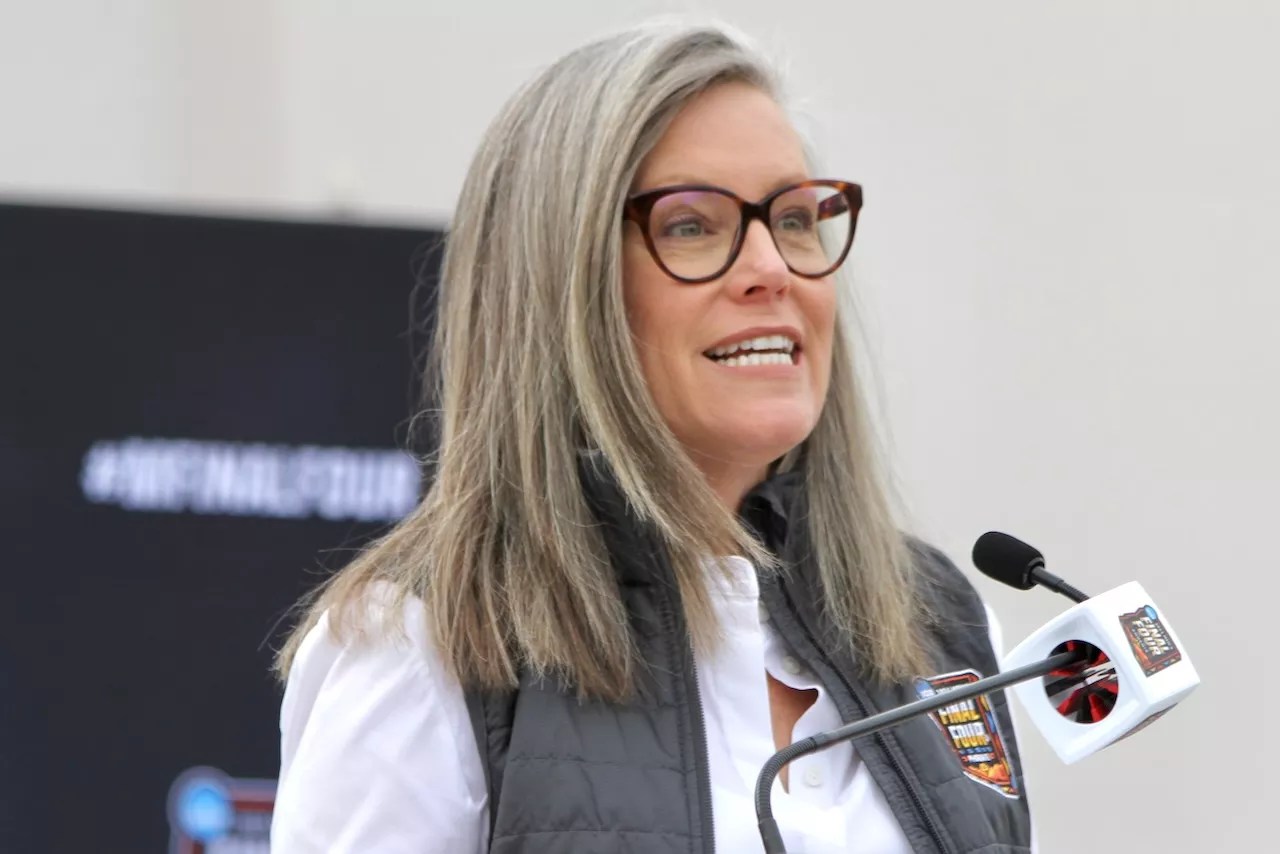
Gage Skidmore/Flickr/CC BY-SA 2.0

Audio By Carbonatix
The game of cat and mouse between Republicans and Gov. Katie Hobbs over how to fund a $122 million budget shortfall with the Arizona Division of Developmental Disabilities is almost over.
Wednesday night, after extended bipartisan negotiations, Democrats and Republicans reached an agreement to amend GOP state Rep. David Livingston’s House Bill 2945. It passed the Arizona House with bipartisan support, 48 to 11, and will now go to the Arizona Senate. If it passes the Senate without any amendments, it will go to Hobbs’ desk.
The saga of the shortfall, which threatened a program meant to help parents of disabled children, was a protracted blame game that lasted months. Hobbs blamed Republicans for playing politics with the program, while Republicans blamed her for being willing to spend carelessly. All the while, a May 1 deadline to backfill the program loomed.
Working into the evening Wednesday, lawmakers and Hobbs’ team finally worked out the kinks.
The bill will continue to pay parents enrolled in the Parents as Paid Caregivers program for working up to 40 hours caring for their children, despite Livingston initially proposing to cut that cap in half. To make up for the shortfall, the bill will no longer raid the state’s Housing Trust Fund, which addresses homelessness and housing affordability, as Republicans proposed. Instead, it will pull from a prescription drug rebate fund that is flush with cash.
In turn, Republicans were able to keep in the bill a new requirement that the legislature approve all Centers for Medicare and Medicaid Services waivers – which allow states to operate health care programs like PPCG differently from standard federal rules – and a mandate that the PPCG program be audited by the Arizona Auditor General.
After the amended bill passed Wednesday, both sides claimed victory. In a statement, Hobbs wrote, “I am grateful to see House members on both sides of the aisle come together to advance common sense proposals. It’s time for the Senate to get this negotiated bill on my desk to protect services for these families.”
Republican Rep. Matt Gress, the former budget director for ex-Gov. Doug Ducey who has been a thorn in Hobbs’ side, took a final dig at Hobbs, calling “the intent of continuing PPCG … humane” but chiding Hobbs for “bypassing the legislature” when she made the program permanent without lawmaker approval, which “has placed these families and the entire Division of Developmental Disabilities at great risk.”
“No program, not matter how well-intentioned, can sustain itself without proper authorization and funding,” he continued. “House Bill 2945 offers a path forward.”
Alexandra Patterson, who spoke to New Times earlier this month about how the PPCG allows her to care for her 2-year-old son, Aries, expressed relief when contacted about the bill’s passage.
“I think that it is a better bill than what was being proposed before and while I don’t agree entirely with all of the smaller details, this is something that I can at least stay here with and keep Aries home with,” she said in a text message. “That is everything to me!”

Amid a shortage of caregivers in Arizona, the Parents as Paid Caregivers Program trains and pays parents to care for their severely disabled children up to 40 hours a week.
Morgan Fischer
How we got here
The DDD became a political football months ago.
During the COVID-19 pandemic, the federal government began the Parents as Paid Caregivers program to support families who received state assistance for in-home care for their children. With Arizona facing a shortage of medical personnel, parents could now be paid for providing the round-the-clock care required by developmentally disabled children.
When temporary federal COVID-19 funds began to dwindle, Hobbs requested that the federal government make the program permanent in February 2024. Arizona would have to pick up 35% of the program’s costs, an obligation that began in January.
Due to unexpectedly large enrollment in the program, the Division of Developmental Disabilities faced a $122 million budget shortfall entering this calendar year. As a result, the DDD would run out of money on May 1, with two months to go in the state’s fiscal year, which ends June 30. That would leave families and children without essential services.
Hobbs pushed for a clean supplemental funding bill to make up the difference, noting that the legislature has passed such bills routinely for other programs in the past. But Livingston and Gress pushed for legislation that would increase legislative oversight of the program and cut its costs by limiting the number of hours for which parents could be paid. Additionally, Livingston and Gress blamed Hobbs for extending the PPCG program without legislative approval, while Hobbs criticized them for dragging their feet to pass a funding solution.
While parents who benefit from the program railed against Republicans for playing games with their lives, Livingston stuck to his guns. Last week, he stacked a House committee with extra Republican members in order to defeat a bipartisan amendment that would have watered down the cuts he wanted. As a result, Hobbs vowed to veto any bill that crossed her desk until a palatable compromise was struck.
That compromise came Wednesday night.

Gov. Katie Hobbs signaled she would sign the amended bill to fund the Division of Developmental Disabilities.
Matt Hennie
What happened Wednesday?
As late as Wednesday afternoon, a compromise seemed far off.
Earlier in the day, new amendments to HB 2945 and its mirror bill in the Senate, Senate Bill 1734, backed off from cutting PPCG hours in half and instead continued the current 40-hour cap. However, the Gress-backed amendment pulled funds for DDD from the Housing Trust Fund.
Hobbs called the amended bill “dead on arrival as it stands,” but emphasized that the two parties are “closer to an agreement” and “must stop wasting time and playing political games as Arizonans with disabilities are their caregivers and pushed closer and closer to the brink.”
Despite the amendment passing in the Senate earlier in the day, the Gress amendment failed to pass the House, with 37 votes against. Members of the far-right House Freedom Caucus joined Democrats to vote against it, though that may have been because the bill didn’t cut the program enough for their liking.
Hours later, around 7:30 p.m., Gress introduced a new amendment on the House floor. It kept legislative oversight of CMS waivers and an audit of the PPCG program, which is required to happen before August 2026. However, it left the Housing Trust Fund alone, pulling instead from the prescription drug rebate fund.
In a quick vote – with lots of kudos to negotiators Republican Rep. Julie Willoughby and Democratic Rep. Nancy Gutierrez, as well as Livingston and Gress – the amendment passed. Moments later, after lawmakers commented in support of the bill, passing it with only 11 votes against.
“This is important that we all came together to pass this,” Republican Rep. Jeff Weninger said on the House floor. GOP Rep. Justin Wilmeth applauded the changes, saying, “I’m very happy to see all the green on the board right now, because this bill this morning may not have gotten 25 Republican votes, and I think that’s the truth. It wasn’t the wise way to go at the start.”
In a press release, Gutierrez said that “while not perfect,” the bill “will protect care and lifesaving services for the most vulnerable Arizonans living with disabilities and does so without harming efforts to address homelessness and affordable housing.” She also urged the Senate “to adopt and pass this language as soon as possible so that the stress and turmoil these families have endured can end.”
The Senate is expected to do so without any amendments, sending it to Hobbs. Given the tenor of Hobbs’ supportive statement, there’s little doubt she’ll sign it.